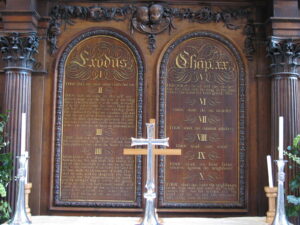from the Altar Screen at Temple Church, London (Creative Commons)
The Third Commandment
You shall not take the Name of the Lord your God in vain; for the Lord will not hold him guiltless who takes His Name in vain.
In the Old Testament, a name is not merely a label for identification. A name expresses the essential nature of its bearer.
The Name of God tells us who He is. Since the nature of the infinite, uncreated, inaccessible, unknowable, indescribable One could not be discovered by mortals, God revealed His Name to us – for our benefit, to protect us from falling away from the true God into idolatry, worship of false gods. In the Holy Scriptures there are actually many Names by which we can call upon Him Because God is holy, these Names are holy, never to be used casually.
Did you know that the most common Old Testament Name for God is “Elohim”, which is plural! “In the beginning Elohim created the heavens and the earth” Elohim said “Let us make man in our image, after our likeness… male and female He created them.” Genesis 1 In this Name, Christians see a clear foreshadowing of the One God in Three Persons.
 Towards the end of the story of Adam and Eve, it says without explaining: “At that time men began to call upon the Name of the Lord.” Genesis 4:26 This refers to God’s “proper name” which, written in Hebrew, is “YHWH”. (Hebrew uses no vowels.) The King James Version translated this as “Jehovah”; some modern Bibles give it as “Yahweh”. Sometimes it is translated simply as “Lord”. We don’t know the pronunciation, because the Jews rarely if ever dared to say it aloud – it was so holy. Some Jews write His Holy Name in English like this: “G-D”.
Towards the end of the story of Adam and Eve, it says without explaining: “At that time men began to call upon the Name of the Lord.” Genesis 4:26 This refers to God’s “proper name” which, written in Hebrew, is “YHWH”. (Hebrew uses no vowels.) The King James Version translated this as “Jehovah”; some modern Bibles give it as “Yahweh”. Sometimes it is translated simply as “Lord”. We don’t know the pronunciation, because the Jews rarely if ever dared to say it aloud – it was so holy. Some Jews write His Holy Name in English like this: “G-D”.
There are other Hebrew Names for God as well. Traditional Rabbinic Judaism held that God’s Names, once written down, should never be erased!
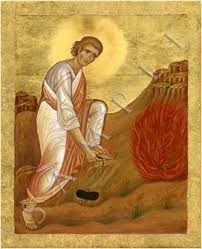 When God came to Moses in the burning bush and commanded Him to lead the Israelites up out of Egypt, Moses asked, “Who shall I say sent me to do this?” God answered, “I am Who I am. Tell them ‘I am’ sent me.” Exodus 3:14. God who is beyond all names, God Who just IS. All the Names He has given us only point into the Mystery.
When God came to Moses in the burning bush and commanded Him to lead the Israelites up out of Egypt, Moses asked, “Who shall I say sent me to do this?” God answered, “I am Who I am. Tell them ‘I am’ sent me.” Exodus 3:14. God who is beyond all names, God Who just IS. All the Names He has given us only point into the Mystery.
“The Lord reigns; let the peoples tremble! He sits enthroned upon the cherubim; let the earth quake! … Let them praise Your great and awesome Name! For He is holy!” Psalm 99
All icons by permission of Saint Isaac’s Skete at Skete.com
New Testament Names for God
In New Testament we are given new Names for God, the chief of which is “Jesus”, God Incarnate, the Son of God. Christ taught us call God “Our Father”. He revealed to us the Holy Spirit, Whom also we call upon. (“O heavenly King, Comforter, Spirit of truth…”) The Church has summed this up in the name “Trinity”, whom we also frequently address: “All Holy Trinity, have mercy on us, cleanse us from our sins…”
Christ identified Himself with the “I am” revealed to Moses: “I am the bread of life…, I am the light of the world…, Before Abraham was I am”. The Jews were shocked, for they knew Who He was claiming HE IS. In the blessing at the end of some Orthodox services, the priest begins “May Christ our true God, the Existing One…” I wish we would translate it plainly; it means “May Christ our true God, He Who IS…”
Jesus taught us to pray: “Hallowed be thy Name”.
“You shall not take the Name of God in vain…”
Fast forward to the modern world. This is the current fashion for taking God’s Name in vain: “Oh my God! Did you see that touchdown?” (One would presume that God who knows all things already knows about the touchdown.) Or in the restaurant: “Oh my God, that tastes terrible!” Or in texts: “Isn’t he cute? OMG”. God’s Name is used to mean no more than “Wow!” or “I don’t like that”.
Actually taking God’s Name in vain has two meanings:
1 Never use God’s Name casually to no purpose, not meaning it. There is power in God’s holy Name, for better or for worse. Using the Name of God either exalts us or debases us, depending.
Now, sometimes using “Oh, my God” is not in vain. As a tornado approaches, or if one is in great pain, or if you see a gorgeous sunset, this may be a prayer: “Oh, my God, help me” or “Oh, my God, thank you!”

Or perhaps people who use OMG are actually secret chemists referring to the Periodic Table – but somehow I doubt that.
So if you have been saying “O my God” all the time, I have some advice for you: CUT IT OUT!! Stop it! I mean, really, how limited is your vocabulary? Surely you can find something else to say. Please.
If you’re in the habit, then every time you take God’s Name in vain, immediately say to yourself: “Blessed be the Name of the Lord. Blessed be the Name of the Lord. Blessed be the Name of the Lord.” This will counter what you said, till you break the habit.
2 However, the primary meaning of “Do not take the Name of the Lord your God in vain” is this: Do not say anything in regard to God that you don’t mean. Do not make promises to God or in the Name of God that you don’t intend to keep. 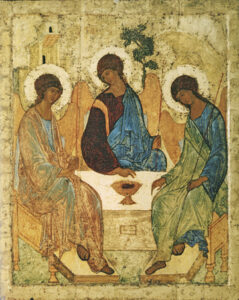 Do not say the Creed if you don’t believe it. Do not tell God you’re sorry if you’re not sorry. If you are to give testimony, do not say “So help me God” if you are not going to tell “the truth, the whole truth and nothing but the truth”. A preacher should never begin “In the Name of God, the Father, the Son and the Holy Spirit” unless he intends of proclaim the Word of God, the Faith of the Church.
Do not say the Creed if you don’t believe it. Do not tell God you’re sorry if you’re not sorry. If you are to give testimony, do not say “So help me God” if you are not going to tell “the truth, the whole truth and nothing but the truth”. A preacher should never begin “In the Name of God, the Father, the Son and the Holy Spirit” unless he intends of proclaim the Word of God, the Faith of the Church.
For God’s Name is holy. Here is the introduction to the Lord’s Prayer in Divine Liturgy: “And grant us, O Master, that with boldness and without condemnation we may dare to call upon thee, the heavenly God, as Father and to say: Our Father…”
COMMANDMENT FOUR:
Remember the Sabbath Day to keep it holy. Six days shall you labor and do all your work; but the seventh day is a sabbath to the Lord your God. In it you shall not do any work, you or your son or your daughter, your man servant or your maidservant, or your cattle or the sojourner who is within your gates; for in six days the Lord made heaven and earth, the sea and all that is in them, and rested the seventh day; therefore the Lord blessed the sabbath day and hallowed it.
The seven day week is arbitrary. Nothing in nature requires it. However, it was in general use before the book of Genesis was written. Genesis uses the seven day week to describe the process by which “God created the heavens and the earth and the sea all that is in them”. Then it says “On the seventh day God rested [the Hebrew word is “shabbat”, ceased, rested, kept a sabbath] from His labors.” Genesis 2:2 That is the origin of the Hebrew Sabbath.
Which day of the week is the Sabbath? the last day, Saturday. Don’t be misled by some modern calendars which put Sunday at the end of the week, at the far right as if it were the seventh day. It is not.
Read the Fourth Commandment carefully: It does not command public worship on the Sabbath. Anciently there was no fixed day for worship. Sacrifices were offered in the Jerusalem temple as 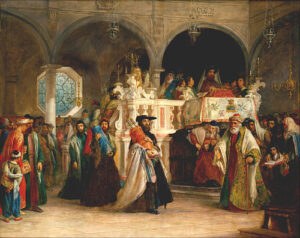 occasion arose. Weekly Sabbath synagog worship apparently did not exist until about 800 years after the time of Moses.
occasion arose. Weekly Sabbath synagog worship apparently did not exist until about 800 years after the time of Moses.
Jewish Art Museum, New York City – from Wikimedia Creative Commons
The purpose of the Fourth Commandment is that people get a weekly day of rest, a day off from work for their benefit – time to pull back and to contemplate the reality and glory of God and His creation, to spend time with family and friends, to discover that there is more to life than work. The intent of the Fourth Commandment is humanitarian, so that people do not become drones or work horses. In Old Testament Law, work is forbidden on the Sabbath: cooking, harvesting, practicing medicine and much more. This Law was sometimes twisted and used against Jesus and those He healed on the Sabbath, but the true purpose of the Sabbath was not to control peoples’ lives; it was to give people a break. As Jesus said, “Man was not made for the Sabbath, the Sabbath was made for man” (Mark 2:27), for the benefit of people.
Christ declared that the the “Son of Man is Lord of the Sabbath”. Matthew 12:8 Christ our God had created the Sabbath, and He can do with it what He wants. Another time when He was being criticized for healing on the Sabbath, He said something equally shocking: “My Father is still working and so am I.” John 5:17 That is, God is now moving beyond the Sabbath Law. He is making a new Creation: His eternal Kingdom.
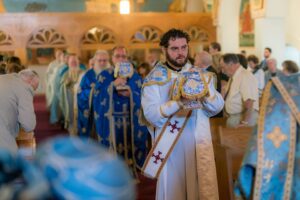
Courtesy of Holy Cross Greek Orthodox Church, Stroudsburg PA
That is how Sunday became our weekly day of worship. Christians, following His lead, felt free to move our day of rest from Saturday to Sunday – because Christ rose from the dead on the first day of the week – a New First Day of Creation, an Eighth Day inaugurating the New Creation.
We Orthodox still retain a few remnants of the Old Testament Sabbath: During Lent, when the full Divine Liturgy is not permitted on weekdays, it may be celebrated on Saturdays, and the Lenten Fast is eased not only on Sundays but also on Saturdays.
“On the Sabbath you shall rest from all your labors.” When my wife and I moved to Wisconsin in 1968, a big issue was whether stores should open on Sundays – something then forbidden by law! The purpose of Sunday closing was, of course, to give employees time off. Well, you know how that turned out. In secularized Western Europe many stores still are closed on Sundays.
Time off need not be on Sundays. Chances of a bishop or parish priest getting Sunday off are slim! and likewise many doctors and nurses and police.
The “Sabbath principle”, now sometimes forgotten in American culture, is simply that all of us need adequate time away from work to relax and be with family and pull ourselves together in the presence of God.
In 1900 the average American worked about 50 hours a week. It was the enlightened (in some ways) American industrialist Henry Ford, who in 1914 doubled his workers’ salaries and reduced this to 40 hours a week, with Sabbath and Sunday off. Most employers resisted this. It was largely through pressure by labor unions that the 40 hour work week was established nationwide in 1938. When I was young I remember how proud Americans were that we had led the world in such things.
Before the Pandemic struck, the average American work week for full time workers was back up to 47 hours. Many IT workers and lawyers and doctors and restauranteurs work more. I’m sure my Bishop Anthony does, too. The official minimum hourly wage has remained at $7.25/hour for over ten years now. You can calculate how that works out: some now have to work two jobs just to keep up. Compared to the rest of the First World (if the statistics are accurate)… I don’t want to talk about this any more.
Most likely, when the economy recovers, American workers will get back to the new normal. To prepare our young people for this, at least here in the suburbs, people tend to schedule many of them with one activity after the other after the other, so that they also have little time off.
All this despite the fact that many studies have shown that workers are more productive, people are more creative, if they get time off. If  you are an employer with “manservants and maidservants”, so to speak, do not overwork your employees. Give them a break.
you are an employer with “manservants and maidservants”, so to speak, do not overwork your employees. Give them a break.
To repeat: Not in a rigid way. When I was still pastoring, I got little regular time off from September through Pascha, so I took it much easier during the summer. As our new mission became a parish church and steadier on its feet, I was firm about getting a month’s summer vacation. That was my Sabbath rest, and when autumn came I know I was refreshed, had new ideas, and was ready to go. On the other hand, my grandfather was a farmer who had no choice. spring through autumn, but to work continually dawn through dusk – so winter was his Sabbath rest. Those who cook daily: ask – no, tell – your spouse to bring food in one day a week, either that or have him/her do the cooking. Well, unless you just love cooking, as my wife does!
 So, dear ones: Now, you find a way to keep your sort of Sabbath, a time of rest and recovery for yourself. Be countercultural. Be a rebel. Stop running. Spend some quiet time with your family, your friends, your self, and above all with your God.
So, dear ones: Now, you find a way to keep your sort of Sabbath, a time of rest and recovery for yourself. Be countercultural. Be a rebel. Stop running. Spend some quiet time with your family, your friends, your self, and above all with your God.
HolyFamily by Julias Frank, 1826-1908
“Six days shall you labor. The seventh day is a Sabbath to the Lord your God.”
I’d hate to think that a group of illiterate Middle Eastern Semites 3000 years ago was smarter than we are.
Next Two Weeks: Commandments Five through Eight
